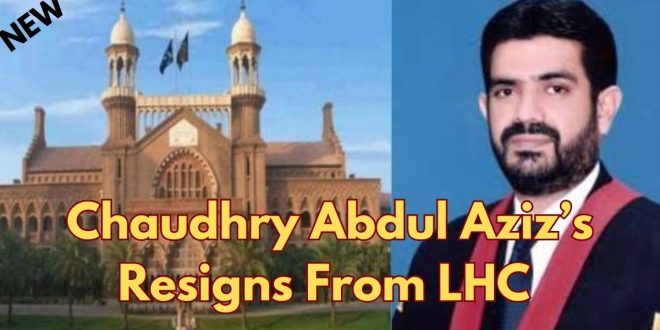In March 6, 2025, Lahore, and right now, there’s a lot of legal and political debate surrounding the resignation of Justice Chaudhry Abdul Aziz from the Lahore High Court and why he resigned so suddenly. His departure has left many issues about the effects of this on the judiciary in Pakistan.
Justice Chaudhry Abdul Aziz Resign
The Lahore High Court Justice Chaudhry Abdul Aziz resignation sparked political assumptions when he sent his resignation application to the Presidents. He also sent it to the Chief Justice of Pakistan and the Chief Justice of Lahore High Court. Even if he states that the Obama-aid of his decision is of personal nature, many have different ideation when it comes to external influences and internal pressures.
His resignation comes at a time where the judiciary’s involvement in various political and constitutional controversies continues to be highly criticized.
Justice Chaudhry Abdul Aziz built a reputation for himself during his service as an honorable member of the judicial branch, a defender of the law and a civil rights activist. His rulings have contributed in one way or the other toward the growth of the law, judicial accountability and civil supremacy in the country. He was known as a senior and well-respected member of the bar, specializing in administrative law, human rights law, and public law proceedings.
A large serving of the legal community is reacting to his resignation with anger, while the Lahore High Court Bar Association has tried to recognize his efforts, stating that he is a great loss to the judiciary. Some legal commentators seem to analyze the possibility of him being affected by some form of internal institutional pressure or political movement. Others in the world of politics believe that his decision to resign will impact the stability among judges in particular with major national interest cases.
Judges of the Lahore High Court believe that with his departure, other judges will have to take on his unfinished work which will undoubtedly alter how and when the work is completed. The development also raises concerns about judicial independence and the general nature of such resignations on the rule of law in Pakistan. The search for an appropriate candidate to take up the position will begin immediately, assuming that the most senior judges will be appointed.
It is now anticipated that the Chief Justice of Pakistan will be in charge of supervising the appointment of a new judge to fill the vacancy. Therefore, the concerned government and judicial authorities might control the public frustrations about the events leading to Justice Chaudhry Abdul Aziz resignation. As the public follows this situation closely, this remains a crucial illustration of how the judiciary in Pakistan struggles and transforms within the usual structure of judicial rule that has developed in the country over time.
 Save Our Pak
Save Our Pak




